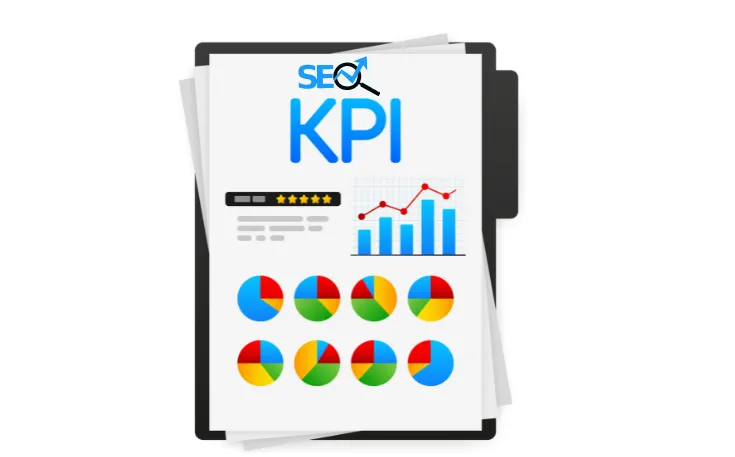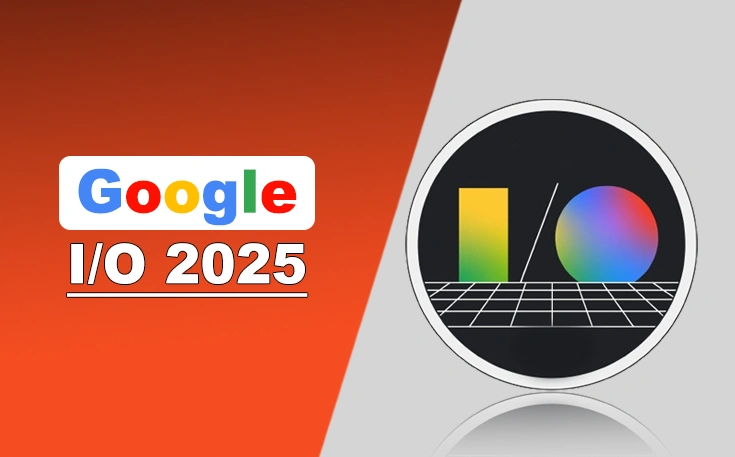Search engine optimisation (SEO) is an ongoing process that requires constant monitoring and refinement. To ensure your strategy is working, it’s essential to track the right key performance indicators (KPIs). These metrics provide insights into your website’s performance and help identify areas for improvement.
In this blog post, I will explain SEO KPIS and the most effective SEO KPIS to monitor and optimise to improve search rankings.
Let’s begin!
SEO KPIs: What They Are and Why They Matter
Companies use SEO KPIS to monitor the effectiveness of their search engine optimisation strategies regarding website visibility and targeted organic traffic acquisition. The important SEO KPIs demonstrate the relationship between your SEO initiatives and business development.
The evaluation of your SEO campaigns works best with KPI measurement, which uses industry benchmarks alongside past performance data from initial launch times.
Business models determine different ways for evaluating the effectiveness of SEO through KPIs. Business objectives require the exact alignment of typical SEO objectives with their matched KPIS, specifically for sectors such as e-commerce and healthcare, where SEO helps to optimise marketing strategies.

Essential SEO KPIs to Boost Your Online Presence
To boost your online business’s presence further, tracking certain SEO KPIs is essential. These include:
- Conversions
- Organic traffic
- Click-through rate
- Keyword rankings
- Organic CTR
- Average position
- Domain authority
Each metric provides valuable insights into your website’s visibility, traffic, engagement, and overall SEO performance.
Organic Conversion Rate
The organic traffic conversion rate is a prime indicator of the effectiveness of your SEO efforts. It measures the percentage of visitors from search engines who perform a desired action on your website, such as purchasing or signing up for a trial.
Therefore, tracking more organic traffic conversions is a crucial element in SEO, as it evidences how well your efforts are translating into business goals.
To improve the conversion rate for your target audience, factors like:
- compelling content
- effective website copy
- strategic keyword use
- clear calls-to-action
Understanding the target audience and their needs is vital for successful marketing campaigns. Tailoring calls-to-action to the buyer’s journey and testing different placements, messages, and designs will optimize conversion rates.
Organic Traffic Growth
The number of visitors from search engine results constitutes organic traffic also known as organic sessions. Your site popularity alongside your SEO success is measured through this important parameter. The length of time which visitors stay on your website matters greatly as a fundamental measurement.
The measurement determines how long users spend on your site through content marketing in their browser involvement to analyze how effectively the content maintains user attention.
Through these important metrics of user engagement you can determine how well site content connects with visitors. When measuring organic traffic session duration it should usually fall between 2 to 3 minutes. The reference value assists organizations in assessing their site performance.
Keyword Performance
Keyword performance is another crucial KPI in SEO. It involves monitoring aspects like:
- keyword rankings
- estimated traffic
- visibility
- share of voice
Tools like the Position Tracking tool provide these metrics, which are vital for monitoring keyword performance, organic search results and ranking others.
Regular keyword research helps identify relevant keywords with high search volume and low competition, which can be targeted to improve SEO performance. Awareness of the competition for keywords is vital as it directly impacts the ability to rank and drive traffic in search and search engine results pages.
Additionally, analyzing what specific keywords your competitors are ranking for is essential to adjust SEO strategies and stay competitive in search rankings.
Advanced SEO KPIs for In-Depth Analysis
For a deeper insight into your SEO performance, it’s important to monitor advanced KPIs. These include the long tail performance of targeted keywords, the organization of target keywords into campaigns, and the optimization of user experience through search engine marketing.
These KPIs provide a nuanced understanding of your SEO performance and the impact of your optimization efforts on related search terms.
Branded vs Non-Branded Traffic
Distinguishing between branded and non-branded traffic can provide insights into your brand strength and audience search behaviour, which are critical to improve SEO strategies.
Segmenting organic traffic into brand and non-brand keywords is vital to differentiate the effects of paid advertising and SEO efforts from other digital marketing activities and better understand potential customers and market share exposure.
Tools like Semrush can measure the split of branded versus non-branded traffic. Additionally, Google Search Console allows for tracking non-branded traffic performance by filtering out branded keywords from searches.
User Engagement Metrics
Appealing websites which deliver quality content together with excellent user experiences normally achieve lower bounce rates and higher positions in SERP search rankings.
Sites with low bounce rates prove they serve users properly, thus improving their ranking position for search engine results pages (SERPs) regarding targeted keywords.
The time users stay on pages, alongside their rate of clicking further, signals search engines about users’ satisfaction with the content. An assessment of page retention times across different page speeds on the site allows us to evaluate content effectiveness because users interact longer with valuable content.
Site engagement metrics based on page usage track user interest levels during each session.
Backlink Profile Analysis
A diverse backlink profile with high-quality referring domains boosts a site’s authority and positively impacts its search engine result pages and rankings. Backlink analysis is crucial as search engines consider links indicators of a site’s authority and more traffic, which involves assessing the volume and quality of inbound links.
Identifying harmful links through backlink analysis is imperative to avoid Google penalties and ensures a site maintains a trustworthy and link-building profile by disavowing them internally linking them.
Moreover, analyzing competitors’ backlink profiles and ranking factors can provide strategic insights, indicating the challenges of outranking them and illuminating potential link-building avenues.
Leveraging SEO Tools for Effective KPI Tracking
SEO tools that can be leveraged for effective KPI tracking and data-driven decision-making include:
- Google Analytics
- Ahrefs
- SEMRush
- Moz
Google Analytics can be synchronized with Google Search Console to gather more comprehensive SEO data, enhancing the effectiveness of SEO strategy tracking and providing valuable insights for SEO services.
Google Analytics provides accurate reporting and analysis for SEO performance with features like filters, Content Drilldown reports, Annotations, along with setting SEO goals.
Backlink analysis can be conducted using tools like Google Search Console, Ahrefs, and Semrush, which help monitor backlinks and audit for harmful links.
Aligning SEO KPIs with Business Objectives
It’s important to integrate SEO goals with business goals to ensure that increases in website traffic also contribute to key business objectives such as generating revenue and enhancing brand visibility.
Prioritizing the metrics crucial to business needs in SEO strategies ensures that SEO efforts are directly contributing to core business goals.
Collaboration between various departments within a business is crucial to ensure that SEO efforts are aligned with broader business goals and objectives, allowing for cohesive strategies that drive overall business growth. Moreover, SEO objectives need to be SMART:
- Specific
- Measurable
- Achievable
- Relevant
- Time-bound
This will effectively drive and measure success in relation to customer lifetime value to business growth.
Common Challenges and Pitfalls in Measuring SEO KPIs
The process of measuring SEO Key Performance Indicators involves specific hurdles to overcome. The measurement of SEO return on investment becomes complicated because it takes days for businesses to detect returns. You calculate SEO ROI through an ROI investment formula which starts from subtracting initial costs but adding total revenue and dividing the total by initial costs.
Measuring SEO performance requires year-over-year comparison because content creation and campaign changes may affect the metrics. Accounting for unusual user behavior affects average time on site because this KPI becomes intricate to use for measuring engagement successfully.
Tips for Continuously Improving Your SEO Performance
Continuously improving SEO performance involves various strategies. For example, high traffic keywords, optimising lead-capturing forms, streamlining account signups, and simplifying purchase processes can significantly improve conversion rates.
Employing continuous A/B testing and conversion funnel analysis is crucial in identifying and optimising elements critical to improving conversion rates.
Building trust and credibility with users can significantly further your search engine visibility and increase conversions from organic traffic. Here are some practical methods for improving user engagement, which is vital for SEO success:
- Incorporate reviews from satisfied customers
- Ensure secure connections and reliable guarantees
- Enhance site speed and mobile experience
- Keep content fresh and up-to-date
Regular website audits can help ensure that your search engine optimisation and SEO strategies remain in step with your business objectives and reveal areas for further search engine optimisation and development.
To Sum Up
Understanding and optimising SEO KPIs is important in this digital marketing landscape. From understanding the basics of SEO KPIs to diving into the nuances of advanced metrics, businesses can effectively measure their SEO efforts and align them with their overall objectives, driving growth across various industries.
With continuous improvement and regular audits, businesses can ensure their SEO strategies remain aligned with their objectives and anticipate future trends.
Frequently Asked Questions
What are the 3 main objectives of SEO?
The three main objectives of SEO are lead generation and direct marketing, increasing raw traffic to your website, and increasing e-commerce sales. These objectives can have a significant impact on page speed, your business growth and online presence.
What are SEO KPIs?
SEO KPIs are metrics used to measure the effectiveness of SEO strategies in improving website visibility and driving specific organic traffic. They help evaluate the success of SEO efforts in achieving specific goals.
What is the importance of organic conversion rate in SEO?
The organic conversion rate is crucial in SEO because it measures the percentage of visitors from search engines who take a desired action on your website, serving as a key indicator of the effectiveness of your SEO strategies.
Why is it important to distinguish between branded and non-branded traffic?
It is important to distinguish between branded and non-branded traffic because it provides insights into your brand strength and audience search behavior, essential for refining SEO strategies.
How can SEO tools be leveraged for effective KPI tracking?
You can leverage SEO tools such as Google Analytics, Ahrefs, SEMRush, and Moz for accurate reporting and analysis of SEO performance, helping you make data-driven decisions.





